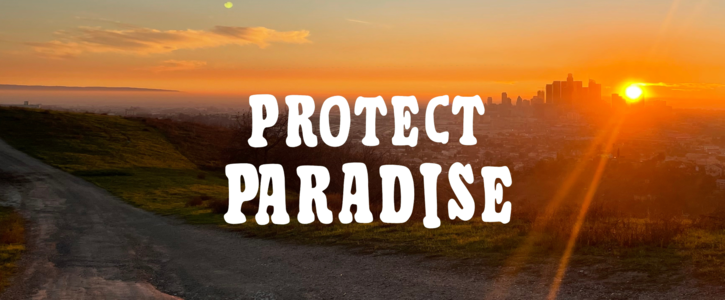To: NELA Community
Protect Paradise Hill
.png)
Developers Beware. The Northeast Los Angeles community stands united in opposing any potential development of Paradise Hill. Paradise Hill is a rare 30-acre open green space that is critical for the health and well-being of local residents as well as the wildlife that inhabits its land.
Paradise hill is zoned for agricultural use, not for residential development and all attempts at rezoning will be widely contested. Paradise hill is comprised of sandstone and sits near a faultline. Any commercial or residential development would erode the substandard hillside, increasing the potential for landslides and mudslides, which would be detrimental to existing and future residents. All efforts to develop this land will be vigorously opposed and the community will be unwavering in its efforts to preserve it.
Paradise hill is zoned for agricultural use, not for residential development and all attempts at rezoning will be widely contested. Paradise hill is comprised of sandstone and sits near a faultline. Any commercial or residential development would erode the substandard hillside, increasing the potential for landslides and mudslides, which would be detrimental to existing and future residents. All efforts to develop this land will be vigorously opposed and the community will be unwavering in its efforts to preserve it.
Why is this important?
Paradise Hill is an active wildlife corridor, home to over 60 species; 43 bird species, 14 mammal species, and three reptile species. This includes federally protected and threatened Bobcats, Peregrine Falcons, American Kestrels, and Great-horned Owls. Paradise Hill is also home to one of the last remaining Black Walnut groves in Los Angeles, an endangered tree that provides critical shade, food, and habitat. In the history of this land, black walnuts were used as hair dye by the local residents of the village of Otsungna, and the wild roses growing here gave the village its name that persisted in the Spanish name Rancho Rosa Castilla, and today in the neighborhood called Rose Hills.
The parcel once belonged to the city of Los Angeles, but in 1968 a coordinated effort between developers and corrupt officials resulted in a change of hands that ultimately left the entire 30 acres under the ownership of a wealthy development company. Many visions for developing and exploiting this land have come and gone in the decades since, and some still dream of that. The community that lives around this special place imagines another future for it: as a natural space for people and wildlife to find peace on a hilltop overlooking the heart of the city.
The community stands united in protecting this rare and sacred land and opposes any development and degradation of Paradise Hill.
The parcel once belonged to the city of Los Angeles, but in 1968 a coordinated effort between developers and corrupt officials resulted in a change of hands that ultimately left the entire 30 acres under the ownership of a wealthy development company. Many visions for developing and exploiting this land have come and gone in the decades since, and some still dream of that. The community that lives around this special place imagines another future for it: as a natural space for people and wildlife to find peace on a hilltop overlooking the heart of the city.
The community stands united in protecting this rare and sacred land and opposes any development and degradation of Paradise Hill.
